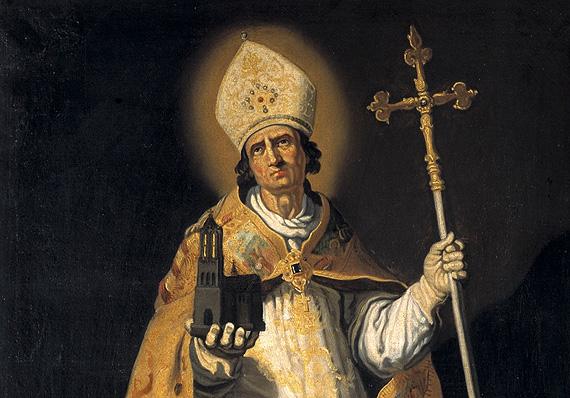Saint of the Day – 7 November – St Willibrord (c 658 – 739) “Apostle to the Frisians” – Bishop, Missionary – born in c 658 at Northumbria, England and died on 7 November 739 of natural causes, aged 81. Patronages – Convulsion, epilepsy, epileptics, Luxembourg, Netherlands, Archdiocese of Utrecht, Netherlands, Heusden, Belgium, Waalre, Netherlands.
Willibrord was born in Northumberland in c 658 and when twenty years old, went to Ireland, to study under St Egbert. Twelve years later, he felt drawn to convert the great pagan tribes who were hanging as a cloud over the north of Europe, at the request of Pepin of Herstal, Austrasian mayor of the palace, who had nominal sovereignity over that region.
Willibrord travelled to Rome twice. Both of these trips to Rome have historical significance. As Venerable Bede tells us, Willibrord was not the only Anglo-Saxon to travel to Rome. The way in which he described the visit and its purpose is important; unlike all the others, Willibrord was not on the usual pilgrimage to the graves of the apostles Peter and Paul and the martyrs. Rather “he made haste to Rome, where Pope Sergius then presided over the apostolic see, that he might undertake the desired work of preaching the Gospel to the Gentiles, with his licence and blessing”. As such he came to the pope not as a pilgrim but specifically as a missionary.
The second time he went to Rome, on 21 November 695, in the Church of Santa Cecilia in Trastevere, Pope Sergius I gave him a pallium and consecrated him as bishop of the Frisians. He returned to Frisia to preach and establish churches, among them a monastery at Utrecht, where he built his cathedral. Willibrord is counted the first Bishop of Utrecht.
In 698 he established the Abbey of Echternach on the site of a Roman villa in Echternach, which was donated to him by Pepin’s mother-in-law, Irmina of Oeren, the wife of seneschal and Count Palatine Hugobert. After Hugobert died, Irmina founded a Benedictine convent at Horren in Trier. When a plague threatened her community, she gained the help of Willibrord and when the pestilence passed by the convent, she gave Willibrord the lands for his abbey in Echternach.
Pepin of Heristal died in 714. In 716 the pagan Radbod, king of the Frisians, retook possession of Frisia, burning churches and killing many missionaries. Willibrord and his monks were forced to flee. After the death of Radbod in 719, Willibrord returned to resume his work, under the protection of Charles Martel. Winfrid, better known as St Boniface, joined Willibrord and stayed for three years, before travelling on to preach in Frankish territory.
He laboured unceasingly as bishop for more than fifty years, beloved alike of God and of man and died full of days and good works. According to his wish, was buried in Echternach. He was quickly judged to be a saint. Willibrord springs, which skirted his missionary routes, were visited by the people, to solicit the healing of various nervous diseases, especially of children.
Numerous miracles and relics have been attributed to him. On one occasion, the transport of his relics was celebrated thus “the five bishops in full pontificals assisted; engaged in the dance were 2 Swiss guards, 16 standard-bearers, 3,045 singers, 136 priests, 426 musicians, 15,085 dancers, and 2,032 players”. A Dancing Procession continues to be held in Echternach every year on Whit Tuesday and attracts thousands of participants and an equal number of spectators, to honour the memory of a saint who is often called the apostle of the Benelux countries (Belgium, the Netherlands, and Luxembourg). His relics are enshrined at Echternach, Luxembourg and in the Cathedral of Saint Catherine in Utrecht, Netherlands.




5 thoughts on “Saint of the Day – 7 November – St Willibrord (c 658 – 739) “Apostle to the Frisians””